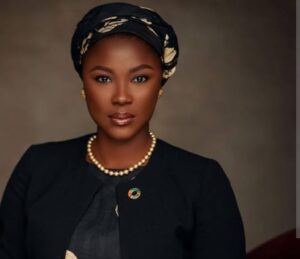Dr. Jamila Bio Ibrahim, the Minister of Youth Development, has urged young people to establish climate-friendly businesses and adopt clean energy alternatives in the nation.
She made these remarks during a Climate Festival hosted at DePeace Hotel in Ilorin, the capital of Kwara State, on May 31 and June 1, 2024.
The Climate Festival, themed Climate Action in Nigeria: Balancing Climate Obligations with National Realities, was hosted by Plogging Nigeria, an environmental non-governmental organization driven by youth dedicated to sustainability advocacy.
The conference covered a range of critical topics including sustainable energy access, food security, circular economy, waste management, recycling, and urban agriculture.
During her keynote address, Ibrahim urged young people to act as custodians of the nation’s heritage, emphasizing that reckless actions that disrespect national resources endanger the collective well-being of the country.
Representing the minister were Prince Momoh Olugbenga and Mrs. Lami Bature, Directors of Enterprise Development and Promotion at the Ministry of Youth Development.
She called on youths to prioritize the production of healthier food by employing climate change mitigation strategies and utilizing clean energy sources.
She emphasized that Nigeria’s achievements should not solely rely on economic prosperity but also on environmental preservation.
She mentioned that we must come together as guardians of our natural heritage, ensuring its preservation for future generations. Economic benefits should never come at the expense of our shared resources. But we should reject short-term gains that threaten our long-term survival.
Climate action serves as our moral compass. Our national progress depends on responsible environmental stewardship. Poverty alleviation, well-being, and longevity are inherently linked to environmental conservation.
Degrading our land, oceans, and forests undermines our collective well-being. Nigeria’s commitment to achieving net-zero emissions by 2060 aligns with our energy transition strategy—a forward-thinking approach to reducing emissions and enhancing energy accessibility.
The event also saw the presence of Mallam Shehu Ndausa, the Kwara State Commissioner for Environment, who underscored the urgent need for action to combat climate change. He highlighted the severe consequences for food security, energy accessibility, health, and biodiversity if no action is taken.
Mariam Imam, the Senior Special Assistant to the Kwara State Governor on Sustainability Development Goals, urged both individuals and businesses to reflect on and reassess the impact of their operations and actions on the environment and society.
 Mr. Mayokun Iyaomolere, the Executive Director of Plogging Nigeria, stressed that Nigeria should pursue climate action in harmony with its unique economic, social, and environmental realities as a country.
Mr. Mayokun Iyaomolere, the Executive Director of Plogging Nigeria, stressed that Nigeria should pursue climate action in harmony with its unique economic, social, and environmental realities as a country.
During Day Two of the Climate Festival, attendees gathered at the recently constructed Flyover bridge in Tanke, Ilorin, which served as the starting point for the 10km Ploggathon race.
The concept of Ploggathon originated from the organization’s main activity of Plogging, inspired by the Swedish initiative called Plocka-up, which involves running while picking up litter.
Ploggathon Ilorin marks the second edition of the event since its inauguration in Abuja a year ago.




